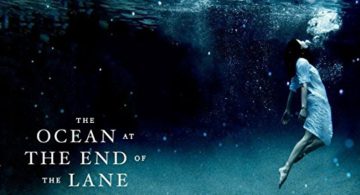
I just finished reading Neil Gaiman’s The Ocean at the End of the Lane and it was a fantastic book that led me to do a bit of introspection about memories and being. Time Magazine describes it as follows:
A novel about the truths — some wonderful, some terrible — that children know and adults do not.
The story follows a middle-aged man who has returned to his childhood home to attend a funeral. He remembers a friend, Lettie, who he knew when he was 7 years old, and that she moved to Australia. She used to live with her mother and grandmother at the house at the end of the lane and they had a pond by the house. Lettie had convinced him that the pond was actually an ocean.
He makes his way to her house and finds her grandmother still living there. Taking a seat by the pond, his mind wanders back in time to when he knew her and what happened to her. Through the course of the story, we discover that Lettie was special and she didn’t really move to Australia, instead she now lives in the ocean. I do not want to give more spoilers, so if this seems strange and you are curious how, you will have to read the book.
Reflections
The story is narrated by a middle-aged man and as he recounts his adventures as a seven year old, he often mentions what he would have thought of the same if he was older. He mentions the joy in drinking milk freshly milked from a cow, a bowl of cereal and the warmth of the fire. As we grow older, we forget the many little things that give us joy. The glass of milk in the morning gets replaced by a mug of coffee and there are fewer days when we actually enjoy breakfast with family, without worrying about the time ticking away, the bus we must catch, the time left to get to office on time.
I do not miss childhood, but I miss the way I took pleasure in small things, even as greater things crumbled. I could not control the world I was in, could not walk away from things or people or moments that hurt, but I took joy in the things that made me happy.
A child does not have many choices but he also does not have so many things on his mind. A child can enjoy the glass of milk because that is all that matters to him at that instant because he knows he cannot control the many things around him.

The child believes that he is the centre of the world. As we grow older, I think we still believe that we are the centre, however, we become conscious of the needs of other people — our parents, significant other, siblings, children — they all start to be more than just relationships that exist. They become relationships we maintain.
When I was younger, my mom would take me to visit her cousins and their children. When I grew older, I did not have to do that anymore. I could choose to socialize with them or socialize with other people. It’s the people I chose that I put in effort to keep up with. Often, we meet people who we like and inspite of our efforts, it is not possible to have anything beyond an acquaintance with them.
At this time, we often go down the spiral of questions like “Did I do something wrong?” which puts us at the centre of the actions that someone else took. We do not know if things happened because of circumstances we do not know, and yet we think it could have been us, and we might even beat ourselves about it. However, over time, we do realize that many other things play a role and just as the child knows that he cannot control everything, we know that we cannot control everything. We will try and we might fail.
I learn something everyday and at 24 years of age, I know more than what I did at 7, 10, 16 or even 22, and hopefully, I also know better, but that doesn’t mean I feel like a grown up. The grownup face often has to come up in front of younger siblings and younger children: it’s relative. My mom says that I am an adult and I can make my own decisions. I make my own decisions but I am sure that I will always rely on my parents and peers when I am in need of sound advice. In some cases, I would be able to give good advice, but that does not make me an adult and that also does not make the fears or insecurities I might have go away because I am getting older.
Grown-ups don’t look like grown-ups on the inside either. Outside, they’re big and thoughtless and they always know what they’re doing. Inside, they look just like they always have. Like they did when they were your age. Truth is, there aren’t any grown-ups. Not one, in the whole wide world.

Why do we go down the memory lane?
When life is tough, we often turn back to the past, to remember the good days — the fun we used to have riding our bikes around the city with friends, watching back-to-back movies at the movie theatre… Memories resurface in tough times when we need something else to hold on to. They are the safe place we go to.
The journey down memory lane often leads to bigger questions if the decision we made in the past were correct: the need to be sure that this is the life that I wanted. Lettie’s grandmother explains that the man comes to the lake when Lettie calls to him and wants to know if it was all worth it — the actions that have put her in the ocean. That also reflects the thoughts that the man himself has about his decisions in life, we all have them at some point of time, if we turned out the way we imagined we would.
An episode from How I Met Your Mother comes to mind when Marshall finds a letter written to him by his teenage self who imagines the 30-year old Marshall as a successful environmental lawyer. He has not reached the goals he thought he would have and the episode is about him dealing with what he set out to do and he ended up doing. There are many things we want to do and be in X number of years. It is easy to imagine and yet there are many other things that we cannot imagine which will make it harder for those goals to become reality. This does not mean that they will never be reached — it just means it will take some more time.
Lastly, we change memories to be kinder to ourselves. Our brain locks away some memories because they bring a lot of pain while others are altered a little bit (Lettie moving to Australia, for example), to make life bearable. Some days, we remember the truth of them, and then once we have seen them, we hide them away again because it is easier to live with the version we made up. It takes two people with different versions to find the real version. In this story, Lettie’s grandmother was the link to the original version.
Childhood memories are sometimes covered and obscured beneath the things that come later, like childhood toys forgotten at the bottom of a crammed adult closet, but they are never lost for good.
Also posted on Medium.

Be First to Comment